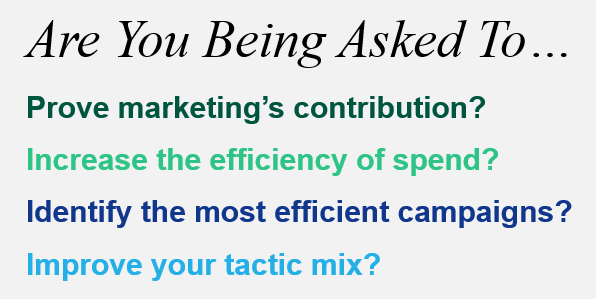Asking The Right Questions For B2B Marketing ROI
What is the answer to the Ultimate Question of Life, the Universe, and Everything? In “The Hitchhiker’s Guide to the Galaxy,” Douglas Adams described a group of beings that waited over 7 million years for a supercomputer to deliver this precious insight. Thankfully, their incredible patience was rewarded with the answer … “42.” This left them to wonder … wait, what was the question? Many B2B marketers face a similar dilemma as they pursue their own Ultimate Question of Marketing, Its Value, and Everything — the elusive and widely misunderstood Marketing ROI. Everyone wants this magic metric, but as they work to calculate it, the “right” answer depends very much on what their real question was.
Many clients get bogged down chasing the perfect formula for demonstrating marketing efficiency. The truth is that much of what we learned in business school about return on investment is a poor fit for the world of B2B marketing. The most commonly used formulas for marketing ROI came out of B2C industries, where quick transactional sales take place without the need for a salesperson. Marketing organizations can increase investment within a specific market and watch the sale of widgets climb in the following days and weeks. In that case, it’s relatively straightforward to compare incremental investment to incremental return. But what if each sale takes a year to complete and requires coordinated execution across dozens of touchpoints from both marketing and sales to guide multiple decision-makers through a complex buying process?
Early in my career, I worked for a software company with the marketing slogan, “Simpler is Better.” That thought comes to mind often when I am assisting clients with analyzing the efficiency of their marketing spend. When faced with the complexity of the B2B sales cycle, many will pursue increasingly complex means to parse out marketing’s impact when the opposite approach is often more effective. Instead of striving for a perfect financial formula, begin with the simplest question you are trying to answer.

Each of those questions are likely answerable with data that your organization is already collecting. But in each case, the metrics used may be different. While there are certainly use cases that call for complex financial calculations, choosing the simplest available metric to correctly inform a decision will save most companies a great deal of confusion and time.
Focusing on the real question being asked can also help spot decisions that ROI can’t fully support. One common example is “Where should I invest my next dollar?” Perhaps you’ll achieve the greatest ROI by increasing investment in your most mature market. How well does that support the long-term growth strategy of the organization? Would you be better served investing in a promising new market that will return lower initial ROI? Determining that answer calls for strategic analysis in which short-term financial return is only one consideration.
Forrester analysts work daily with our clients to help them find the best answers to their business questions. Existing clients can read our recent four-part marketing ROI series, beginning with Marketing ROI: Use Cases For B2B Marketing Efficiency Metrics.
It is critical for marketing operations to dive deeper into requests for ROI metrics to clarify the underlying question driving the request. Likewise, it is equally important to take a proactive approach to educating recipients of any ROI reporting on what insights it can provide and what it cannot. Knowing the real business question that generated the request will go a long way toward ensuring that the work produces a result more meaningful than “42.” On the other hand, here’s hoping that turns out to be the right answer … at least once.
